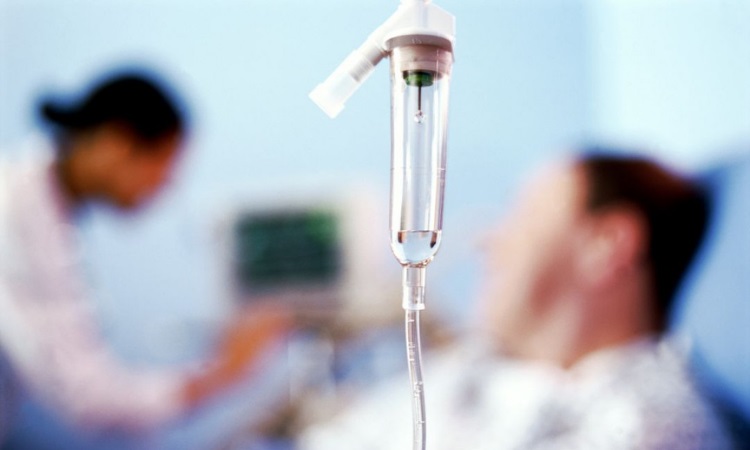How Does IV Hydration Work?

Many people spend most of their time dehydrated and don’t even know it. We assume that the symptoms of dehydration come from being tired or stressed when often the first thing our bodies need is hydration. IV hydration speeds more fluids into your body than trying to drink enough, and it can have added benefits for your health.
What is Dehydration?
The body requires hydration for all essential functions. Our cells need water to keep them functioning, and our blood needs hydration to flow smoothly. People can become dehydrated during an illness, from exercising and not drinking enough fluids to recover, or simply from not drinking enough water every day. Symptoms of dehydration can include:
- Headaches
- Fatigue
- Aching muscles
- Dry, itchy eyes
- Chapped lips
- Brain fog
Many people do not recognize the signs of feeling dehydrated or attribute them to something else, not realizing how much better rehydration could make them feel. By the time you feel the symptoms, your body has already become dehydrated, and you may struggle to drink enough fluids to catch up.

What is IV Hydration?
IV hydration uses an intravenous line to deliver hydration directly into your bloodstream. This improves your absorption of the fluids and gets them into your system faster than trying to drink enough to rehydrate yourself.
Scientific Backing and Safety Considerations
IV hydration therapy has garnered attention for its promise to quickly replenish fluids and nutrients. But what does the research actually show? While the direct delivery of fluids into the bloodstream can lead to faster absorption, the true benefits depend on an individual’s health needs.
For specific medical conditions like severe dehydration, nutrient malabsorption, or during post-surgical recovery, IV hydration has proven to be effective. For example, a study published in the Journal of Parenteral and Enteral Nutrition found that IV fluids outperformed oral hydration solutions for patients with gastrointestinal disorders. This reinforces the value of IV hydration in clinical settings.
Despite these benefits, the use of IV therapy in otherwise healthy individuals remains questionable. Currently, the FDA does not regulate IV therapies offered at many wellness clinics, making it difficult to assess the safety and quality of these treatments.
The lack of regulation poses a significant concern. Dr. Joshua Septimus, a professor of clinical medicine, warns that “IV therapies are generally safe when administered in a controlled medical environment, but unregulated clinics may expose patients to serious risks such as infections, blood clots, or kidney complications.”
Furthermore, it’s crucial to understand the potential risks involved. Individuals with underlying conditions like kidney disease or heart issues should avoid IV hydration unless supervised by a healthcare provider. Complications such as fluid overload, electrolyte imbalance, or allergic reactions can arise, especially if high doses of vitamins or electrolytes are included in the formulation.
How Does IV Hydration Work?
To provide you with IV hydration, a small cannula will be placed under the skin, and the fluids will be hung in a sterile bag above your head so gravity can help the fluids into your body. For basic hydration, the fluid often contains only sterile saline, or water with salts dissolved in it. These salts help rehydrate the body by helping it absorb hydration and by restoring your natural balance of electrolytes. Because the hydration fluid has the same saltiness as blood, the body can use it effectively.
Potential Risks and Who Should Avoid IV Therapy
While IV hydration therapy may seem like a straightforward procedure, it’s not without potential risks—especially when administered without proper medical supervision. The direct infusion of fluids and nutrients bypasses the body’s natural filtration mechanisms, which can lead to unintended consequences.
One common complication is fluid overload. When the body receives more fluid than it can process, it can result in swelling, increased blood pressure, or even fluid accumulation in the lungs. This is particularly dangerous for individuals with pre-existing heart or kidney conditions, where fluid management is crucial.
Electrolyte imbalance is another concern. Certain IV therapies contain high concentrations of electrolytes like sodium, potassium, and magnesium. While these are essential for bodily functions, an excess can disrupt the delicate balance and lead to adverse effects like arrhythmias (irregular heartbeats) or muscle weakness.
Moreover, improperly administered IVs carry the risk of infection at the injection site. If the IV line is not inserted or maintained under sterile conditions, bacteria can enter the bloodstream, potentially causing severe complications such as sepsis. In rare cases, poorly managed IVs can also cause blood clots, which may lead to life-threatening conditions like deep vein thrombosis (DVT).
Who should avoid IV hydration therapy? Generally, individuals with chronic health conditions such as kidney disease, congestive heart failure, or electrolyte imbalances should refrain from undergoing IV therapy unless explicitly recommended by a healthcare provider. Pregnant women and those taking multiple medications should also consult their doctor beforehand, as certain vitamins or additives can interact with medications, causing unwanted side effects.
What are the Benefits of IV Hydration?
The benefits of IV hydration are both immediate, and if you use it regularly to stay well-hydrated, beneficial to your overall functioning. A hydrated body functions better and lets you think more clearly. Benefits of IV hydration can include:
- Quick absorption
- No need to drink large amounts of fluids
- Decrease in headaches
- Less fatigue and more energy
- Relief from muscle cramps
- Hydrated, healthy mucous membranes
- Improved dry eye symptoms
- More alertness
At Cutler Integrative Medicine, we understand that proper hydration is a fundamental cornerstone of keeping the body in a healthy balance. With the body in a state of dehydration, other systems cannot function at their best. IV hydration speeds fluids into your system to quickly refresh your body with an ideal hydration solution.
If you wish, we also offer numerous boosters that you can add to your IV treatment to help optimize your health and well-being.
Conditions and Symptoms Addressed by IV Therapy
IV hydration therapy is often marketed as a catch-all solution for various health concerns, but it’s most effective for specific conditions that disrupt the body’s hydration and nutrient balance. Understanding these use cases helps clarify when IV therapy can be truly beneficial and when it might be unnecessary.
Severe Dehydration: One of the most common and valid uses of IV hydration is in treating severe dehydration. Conditions such as excessive vomiting, diarrhea, or heatstroke can lead to rapid fluid loss that the body struggles to replenish through oral hydration alone. IV therapy helps restore the body’s fluid levels more quickly, reducing symptoms like dizziness, fatigue, and dry mouth.
Chronic Fatigue and Fibromyalgia: Proponents of IV therapy often claim it can alleviate symptoms of chronic fatigue and fibromyalgia. While research on these claims is limited, anecdotal evidence suggests that the infusion of specific vitamins and minerals—such as magnesium and B vitamins—may help reduce muscle cramps and increase energy levels in some patients.
Migraines and Headaches: IV hydration can be beneficial for individuals suffering from frequent migraines or severe headaches. Dehydration is a common trigger for migraines, and rehydrating the body with a balanced mix of fluids and electrolytes can provide rapid relief. Some IV therapies also include magnesium or anti-inflammatory medications that may help reduce migraine intensity.
Nutrient Deficiencies: Certain individuals have difficulty absorbing nutrients from food due to conditions like Crohn’s disease or celiac disease. IV therapy can bypass the digestive system, ensuring direct absorption of essential vitamins and minerals that the body might otherwise lack.
Hangover Recovery: IV hydration has gained popularity as a remedy for hangovers, helping to replenish fluids lost due to alcohol consumption. The addition of electrolytes and vitamins, such as B12, can also help alleviate common hangover symptoms like nausea and fatigue.
While these conditions represent some of the most suitable scenarios for IV hydration therapy, it’s important to remember that not everyone will benefit equally. Consulting with a healthcare professional to determine the right treatment plan is crucial to avoid unnecessary or ineffective therapies.
How Long Do IV Fluids Stay in the Body?
IV fluids typically stay in the body for a few hours after administration, depending on factors such as hydration levels, overall health, and the type of fluid used. On average, the body processes and absorbs most IV fluids within 2-4 hours. However, the exact duration can vary based on an individual’s metabolic rate and fluid retention capacity.
Take the Next Step
Schedule a consultation with Dr. Doug Cutler and his team of expert naturopathic providers to learn more about IV hydration. Call us at (248) 663-0165 today! Cutler Integrative Medicine is dedicated to your health and well-being.
Cutler Integrative Medicine is a premier award-winning wellness clinic that provides patients with unparalleled individualized naturopathic healthcare. Dr. Doug Cutler is a nationally renowned expert in Naturopathic medicine and has the highest training in his field, as well as in Environmental Medicine, IV Nutrient Therapy, and Detoxification. His ClubIV™ is one of the most extensive IV Nutrient Clinics in the country.
You May Also Like




Questions or to Schedule a New Patient Visit
Thank you! Your submission has been received!
Oops! Something went wrong while submitting the form.
.png)

.png)



%201.png)


.png)
.png)
.png)
.png)
.png)

.png)
.png)
.png)
.png)
.png)
.png)
.png)
.png)
.png)

.png)
.png)
.png)
.png)
.png)
.png)
.png)
.png)
.png)
.png)
.png)






.png)



.png)

.png)

.png)